ACCT20074: JB Hi-Fi's Reporting Decisions Through Stakeholder Lens
VerifiedAdded on 2023/06/11
|17
|6001
|109
Case Study
AI Summary
This assignment delves into JB Hi-Fi's reporting decisions, utilizing classical political economy theory and managerial stakeholder theory to explain the company's actions, particularly concerning its profit downgrade announcement. The analysis explores how JB Hi-Fi's decisions align with the principles of market freedom and institutional pressures, highlighting the company's strategic response to stakeholder expectations and resource control. The assignment examines how JB Hi-Fi manages stakeholder relationships, focusing on the influence of powerful stakeholders and the role of information disclosure in gaining support and mitigating opposition. The document provides a comprehensive overview of the theoretical frameworks applied to JB Hi-Fi's case, offering insights into the company's strategic decision-making processes. Desklib is a platform where you can find more solved assignments and past papers.
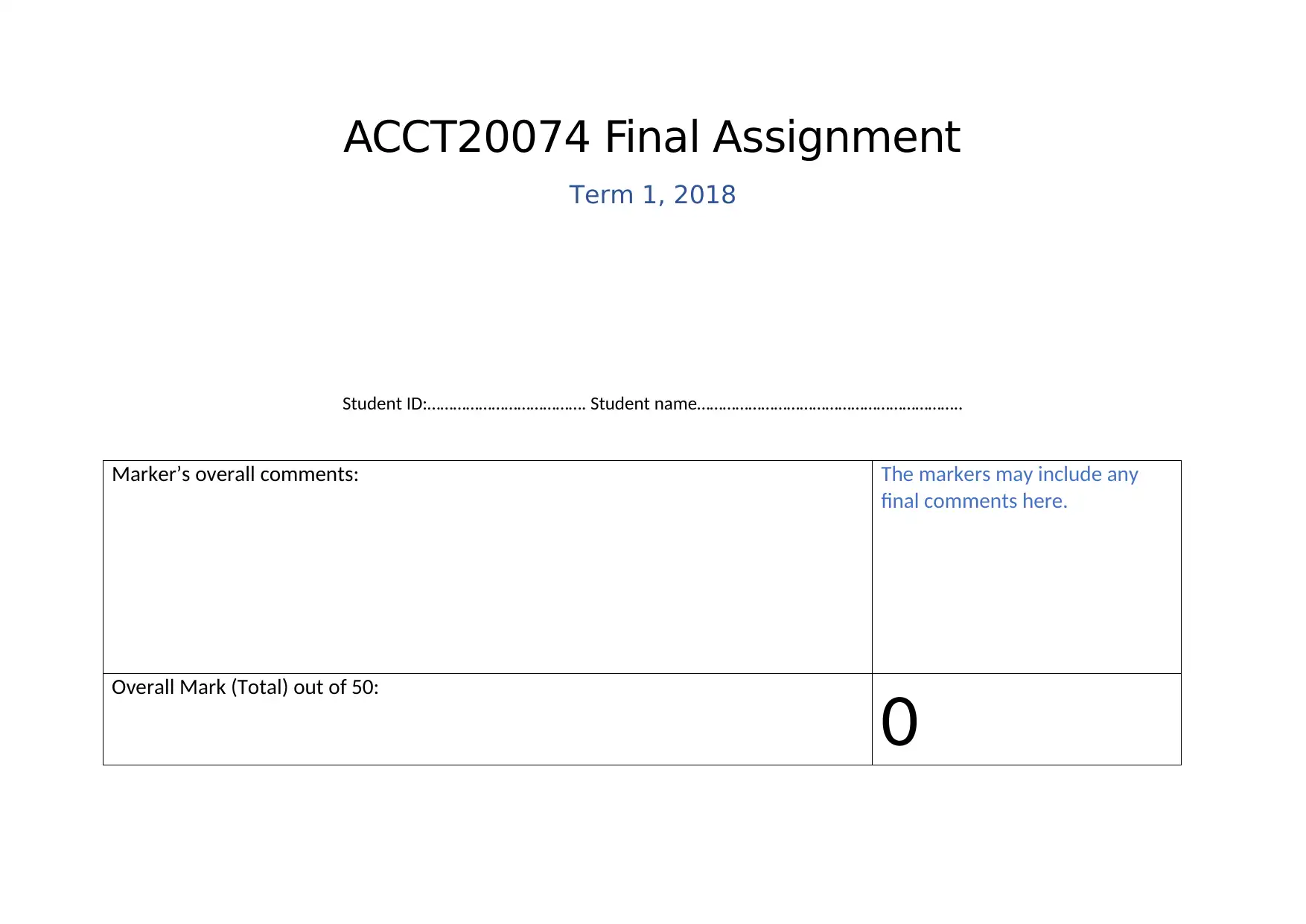
ACCT20074 Final Assignment
Term 1, 2018
Student ID:………………………………. Student name……………………………………………………..
Marker’s overall comments: The markers may include any
final comments here.
Overall Mark (Total) out of 50:
0
Term 1, 2018
Student ID:………………………………. Student name……………………………………………………..
Marker’s overall comments: The markers may include any
final comments here.
Overall Mark (Total) out of 50:
0
Paraphrase This Document
Need a fresh take? Get an instant paraphrase of this document with our AI Paraphraser
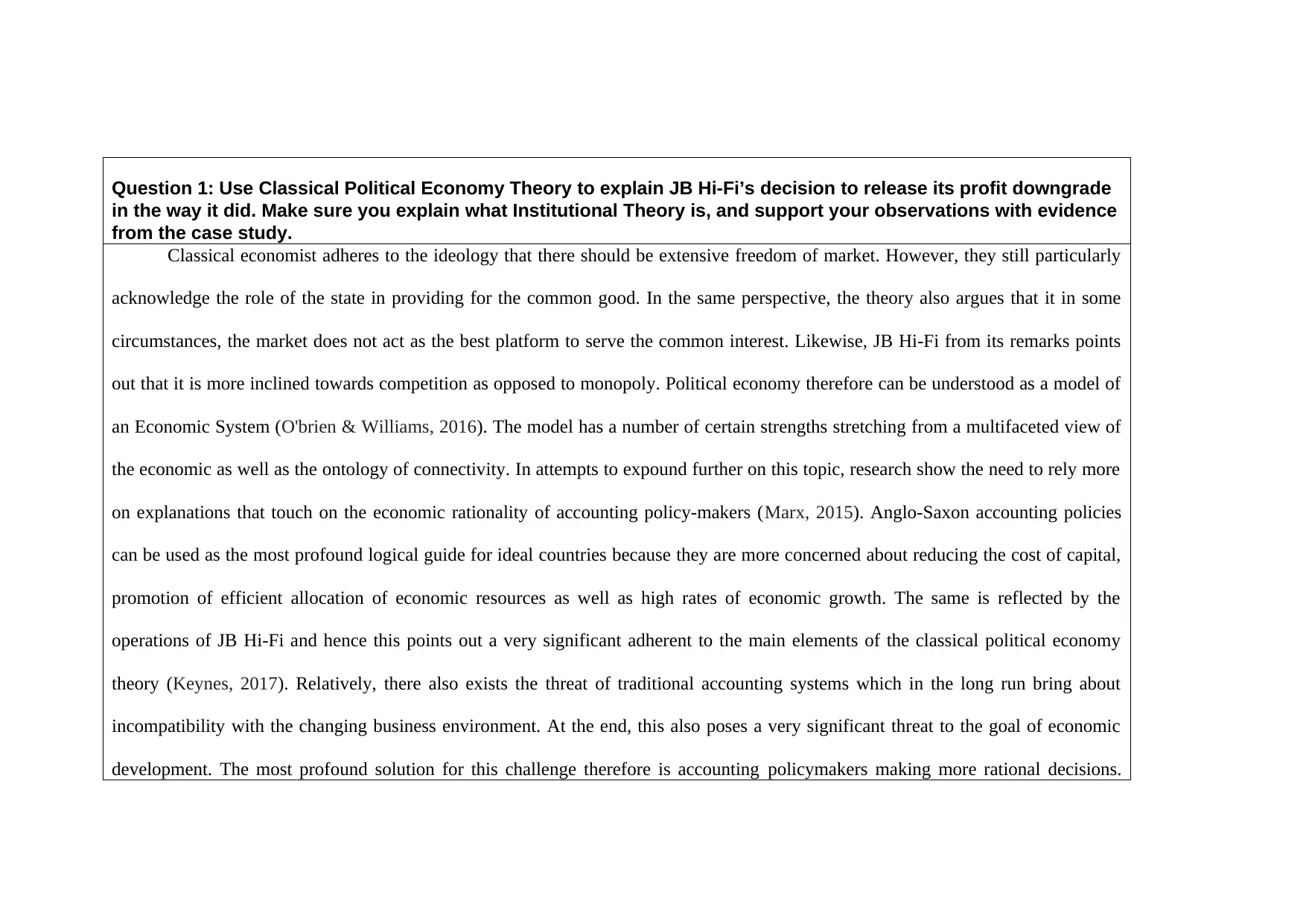
Question 1: Use Classical Political Economy Theory to explain JB Hi-Fi’s decision to release its profit downgrade
in the way it did. Make sure you explain what Institutional Theory is, and support your observations with evidence
from the case study.
Classical economist adheres to the ideology that there should be extensive freedom of market. However, they still particularly
acknowledge the role of the state in providing for the common good. In the same perspective, the theory also argues that it in some
circumstances, the market does not act as the best platform to serve the common interest. Likewise, JB Hi-Fi from its remarks points
out that it is more inclined towards competition as opposed to monopoly. Political economy therefore can be understood as a model of
an Economic System (O'brien & Williams, 2016). The model has a number of certain strengths stretching from a multifaceted view of
the economic as well as the ontology of connectivity. In attempts to expound further on this topic, research show the need to rely more
on explanations that touch on the economic rationality of accounting policy-makers (Marx, 2015). Anglo-Saxon accounting policies
can be used as the most profound logical guide for ideal countries because they are more concerned about reducing the cost of capital,
promotion of efficient allocation of economic resources as well as high rates of economic growth. The same is reflected by the
operations of JB Hi-Fi and hence this points out a very significant adherent to the main elements of the classical political economy
theory (Keynes, 2017). Relatively, there also exists the threat of traditional accounting systems which in the long run bring about
incompatibility with the changing business environment. At the end, this also poses a very significant threat to the goal of economic
development. The most profound solution for this challenge therefore is accounting policymakers making more rational decisions.
in the way it did. Make sure you explain what Institutional Theory is, and support your observations with evidence
from the case study.
Classical economist adheres to the ideology that there should be extensive freedom of market. However, they still particularly
acknowledge the role of the state in providing for the common good. In the same perspective, the theory also argues that it in some
circumstances, the market does not act as the best platform to serve the common interest. Likewise, JB Hi-Fi from its remarks points
out that it is more inclined towards competition as opposed to monopoly. Political economy therefore can be understood as a model of
an Economic System (O'brien & Williams, 2016). The model has a number of certain strengths stretching from a multifaceted view of
the economic as well as the ontology of connectivity. In attempts to expound further on this topic, research show the need to rely more
on explanations that touch on the economic rationality of accounting policy-makers (Marx, 2015). Anglo-Saxon accounting policies
can be used as the most profound logical guide for ideal countries because they are more concerned about reducing the cost of capital,
promotion of efficient allocation of economic resources as well as high rates of economic growth. The same is reflected by the
operations of JB Hi-Fi and hence this points out a very significant adherent to the main elements of the classical political economy
theory (Keynes, 2017). Relatively, there also exists the threat of traditional accounting systems which in the long run bring about
incompatibility with the changing business environment. At the end, this also poses a very significant threat to the goal of economic
development. The most profound solution for this challenge therefore is accounting policymakers making more rational decisions.
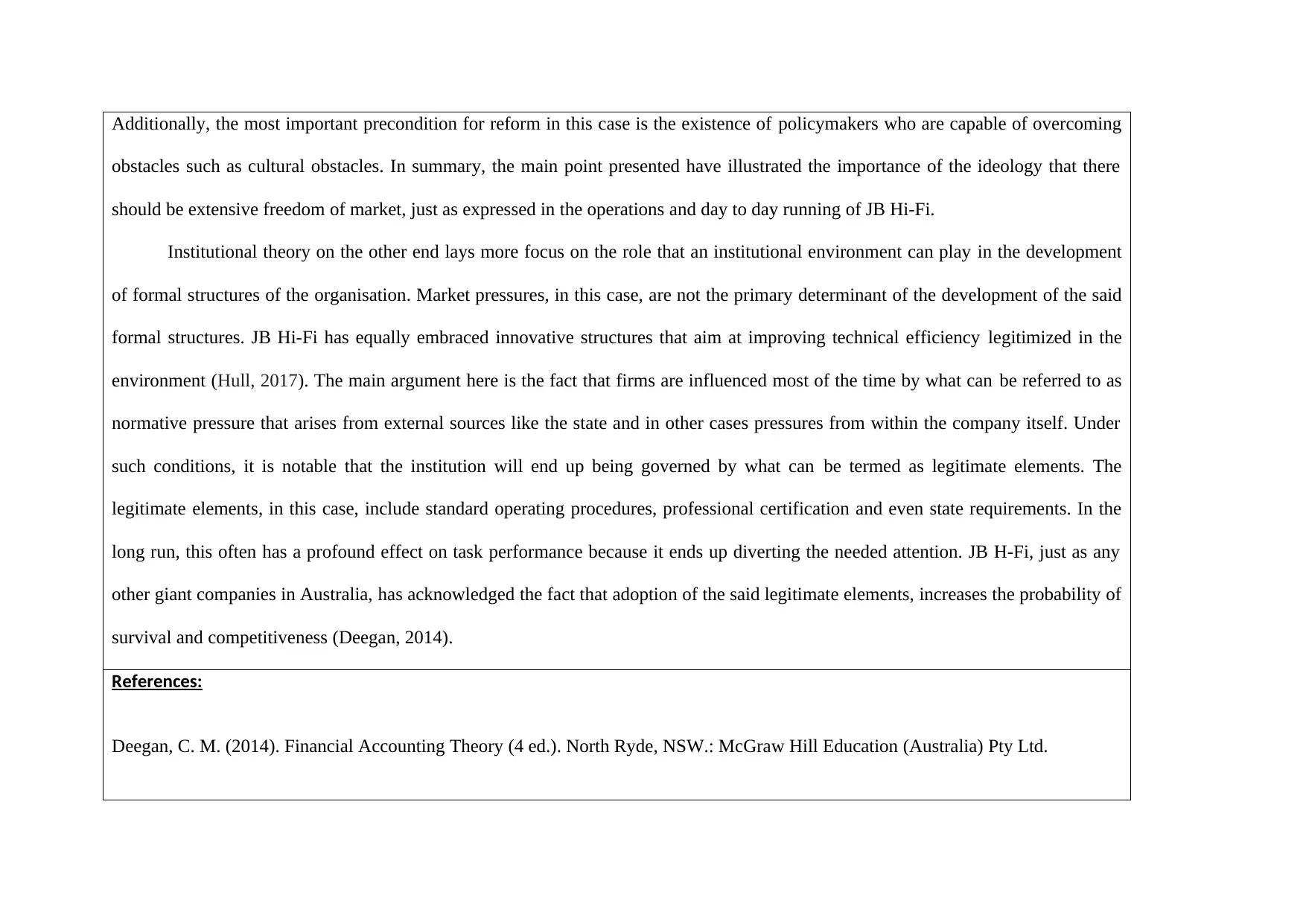
Additionally, the most important precondition for reform in this case is the existence of policymakers who are capable of overcoming
obstacles such as cultural obstacles. In summary, the main point presented have illustrated the importance of the ideology that there
should be extensive freedom of market, just as expressed in the operations and day to day running of JB Hi-Fi.
Institutional theory on the other end lays more focus on the role that an institutional environment can play in the development
of formal structures of the organisation. Market pressures, in this case, are not the primary determinant of the development of the said
formal structures. JB Hi-Fi has equally embraced innovative structures that aim at improving technical efficiency legitimized in the
environment (Hull, 2017). The main argument here is the fact that firms are influenced most of the time by what can be referred to as
normative pressure that arises from external sources like the state and in other cases pressures from within the company itself. Under
such conditions, it is notable that the institution will end up being governed by what can be termed as legitimate elements. The
legitimate elements, in this case, include standard operating procedures, professional certification and even state requirements. In the
long run, this often has a profound effect on task performance because it ends up diverting the needed attention. JB H-Fi, just as any
other giant companies in Australia, has acknowledged the fact that adoption of the said legitimate elements, increases the probability of
survival and competitiveness (Deegan, 2014).
References:
Deegan, C. M. (2014). Financial Accounting Theory (4 ed.). North Ryde, NSW.: McGraw Hill Education (Australia) Pty Ltd.
obstacles such as cultural obstacles. In summary, the main point presented have illustrated the importance of the ideology that there
should be extensive freedom of market, just as expressed in the operations and day to day running of JB Hi-Fi.
Institutional theory on the other end lays more focus on the role that an institutional environment can play in the development
of formal structures of the organisation. Market pressures, in this case, are not the primary determinant of the development of the said
formal structures. JB Hi-Fi has equally embraced innovative structures that aim at improving technical efficiency legitimized in the
environment (Hull, 2017). The main argument here is the fact that firms are influenced most of the time by what can be referred to as
normative pressure that arises from external sources like the state and in other cases pressures from within the company itself. Under
such conditions, it is notable that the institution will end up being governed by what can be termed as legitimate elements. The
legitimate elements, in this case, include standard operating procedures, professional certification and even state requirements. In the
long run, this often has a profound effect on task performance because it ends up diverting the needed attention. JB H-Fi, just as any
other giant companies in Australia, has acknowledged the fact that adoption of the said legitimate elements, increases the probability of
survival and competitiveness (Deegan, 2014).
References:
Deegan, C. M. (2014). Financial Accounting Theory (4 ed.). North Ryde, NSW.: McGraw Hill Education (Australia) Pty Ltd.
⊘ This is a preview!⊘
Do you want full access?
Subscribe today to unlock all pages.

Trusted by 1+ million students worldwide
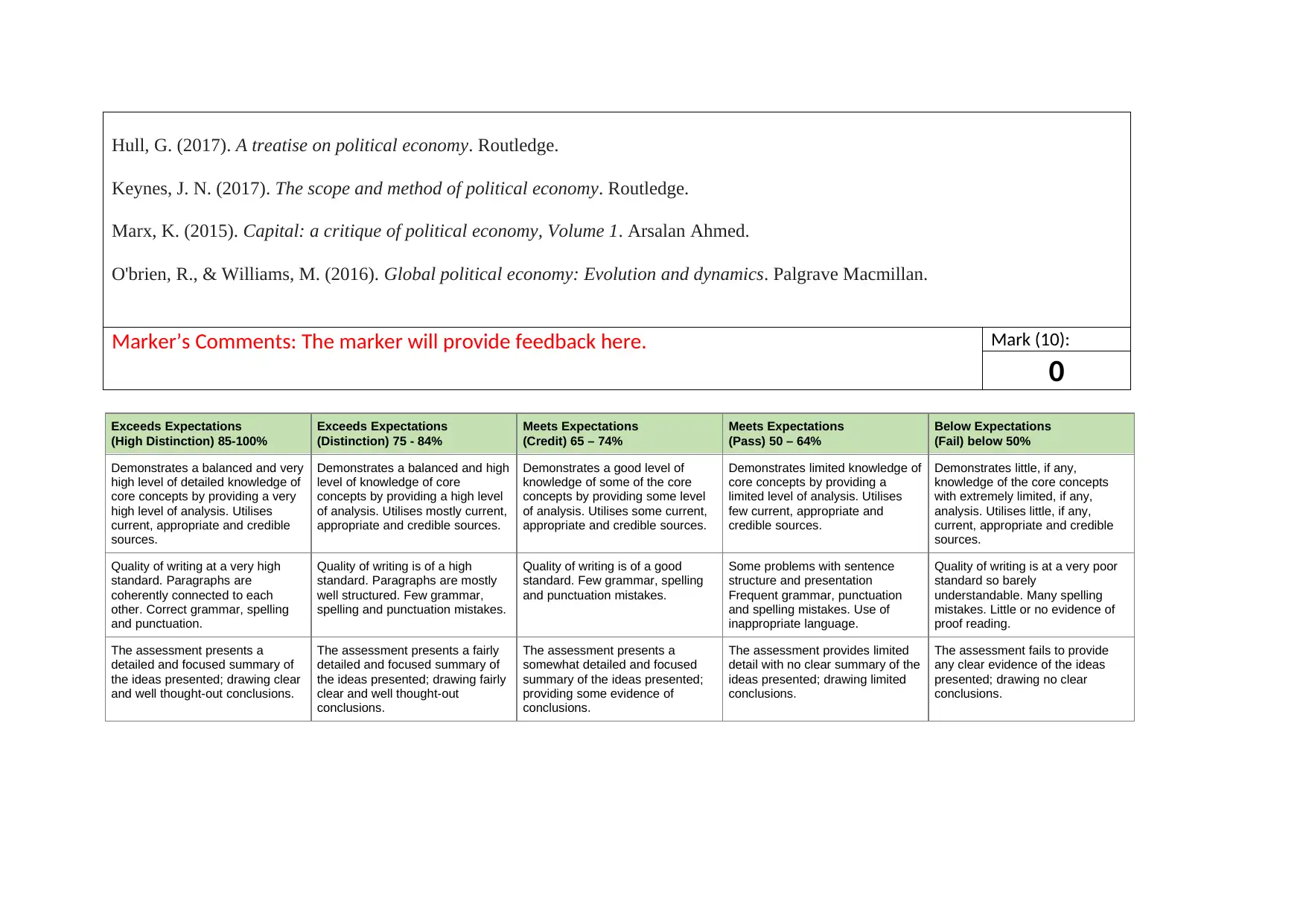
Hull, G. (2017). A treatise on political economy. Routledge.
Keynes, J. N. (2017). The scope and method of political economy. Routledge.
Marx, K. (2015). Capital: a critique of political economy, Volume 1. Arsalan Ahmed.
O'brien, R., & Williams, M. (2016). Global political economy: Evolution and dynamics. Palgrave Macmillan.
Marker’s Comments: The marker will provide feedback here. Mark (10):
0
Exceeds Expectations
(High Distinction) 85-100%
Exceeds Expectations
(Distinction) 75 - 84%
Meets Expectations
(Credit) 65 – 74%
Meets Expectations
(Pass) 50 – 64%
Below Expectations
(Fail) below 50%
Demonstrates a balanced and very
high level of detailed knowledge of
core concepts by providing a very
high level of analysis. Utilises
current, appropriate and credible
sources.
Demonstrates a balanced and high
level of knowledge of core
concepts by providing a high level
of analysis. Utilises mostly current,
appropriate and credible sources.
Demonstrates a good level of
knowledge of some of the core
concepts by providing some level
of analysis. Utilises some current,
appropriate and credible sources.
Demonstrates limited knowledge of
core concepts by providing a
limited level of analysis. Utilises
few current, appropriate and
credible sources.
Demonstrates little, if any,
knowledge of the core concepts
with extremely limited, if any,
analysis. Utilises little, if any,
current, appropriate and credible
sources.
Quality of writing at a very high
standard. Paragraphs are
coherently connected to each
other. Correct grammar, spelling
and punctuation.
Quality of writing is of a high
standard. Paragraphs are mostly
well structured. Few grammar,
spelling and punctuation mistakes.
Quality of writing is of a good
standard. Few grammar, spelling
and punctuation mistakes.
Some problems with sentence
structure and presentation
Frequent grammar, punctuation
and spelling mistakes. Use of
inappropriate language.
Quality of writing is at a very poor
standard so barely
understandable. Many spelling
mistakes. Little or no evidence of
proof reading.
The assessment presents a
detailed and focused summary of
the ideas presented; drawing clear
and well thought-out conclusions.
The assessment presents a fairly
detailed and focused summary of
the ideas presented; drawing fairly
clear and well thought-out
conclusions.
The assessment presents a
somewhat detailed and focused
summary of the ideas presented;
providing some evidence of
conclusions.
The assessment provides limited
detail with no clear summary of the
ideas presented; drawing limited
conclusions.
The assessment fails to provide
any clear evidence of the ideas
presented; drawing no clear
conclusions.
Keynes, J. N. (2017). The scope and method of political economy. Routledge.
Marx, K. (2015). Capital: a critique of political economy, Volume 1. Arsalan Ahmed.
O'brien, R., & Williams, M. (2016). Global political economy: Evolution and dynamics. Palgrave Macmillan.
Marker’s Comments: The marker will provide feedback here. Mark (10):
0
Exceeds Expectations
(High Distinction) 85-100%
Exceeds Expectations
(Distinction) 75 - 84%
Meets Expectations
(Credit) 65 – 74%
Meets Expectations
(Pass) 50 – 64%
Below Expectations
(Fail) below 50%
Demonstrates a balanced and very
high level of detailed knowledge of
core concepts by providing a very
high level of analysis. Utilises
current, appropriate and credible
sources.
Demonstrates a balanced and high
level of knowledge of core
concepts by providing a high level
of analysis. Utilises mostly current,
appropriate and credible sources.
Demonstrates a good level of
knowledge of some of the core
concepts by providing some level
of analysis. Utilises some current,
appropriate and credible sources.
Demonstrates limited knowledge of
core concepts by providing a
limited level of analysis. Utilises
few current, appropriate and
credible sources.
Demonstrates little, if any,
knowledge of the core concepts
with extremely limited, if any,
analysis. Utilises little, if any,
current, appropriate and credible
sources.
Quality of writing at a very high
standard. Paragraphs are
coherently connected to each
other. Correct grammar, spelling
and punctuation.
Quality of writing is of a high
standard. Paragraphs are mostly
well structured. Few grammar,
spelling and punctuation mistakes.
Quality of writing is of a good
standard. Few grammar, spelling
and punctuation mistakes.
Some problems with sentence
structure and presentation
Frequent grammar, punctuation
and spelling mistakes. Use of
inappropriate language.
Quality of writing is at a very poor
standard so barely
understandable. Many spelling
mistakes. Little or no evidence of
proof reading.
The assessment presents a
detailed and focused summary of
the ideas presented; drawing clear
and well thought-out conclusions.
The assessment presents a fairly
detailed and focused summary of
the ideas presented; drawing fairly
clear and well thought-out
conclusions.
The assessment presents a
somewhat detailed and focused
summary of the ideas presented;
providing some evidence of
conclusions.
The assessment provides limited
detail with no clear summary of the
ideas presented; drawing limited
conclusions.
The assessment fails to provide
any clear evidence of the ideas
presented; drawing no clear
conclusions.
Paraphrase This Document
Need a fresh take? Get an instant paraphrase of this document with our AI Paraphraser
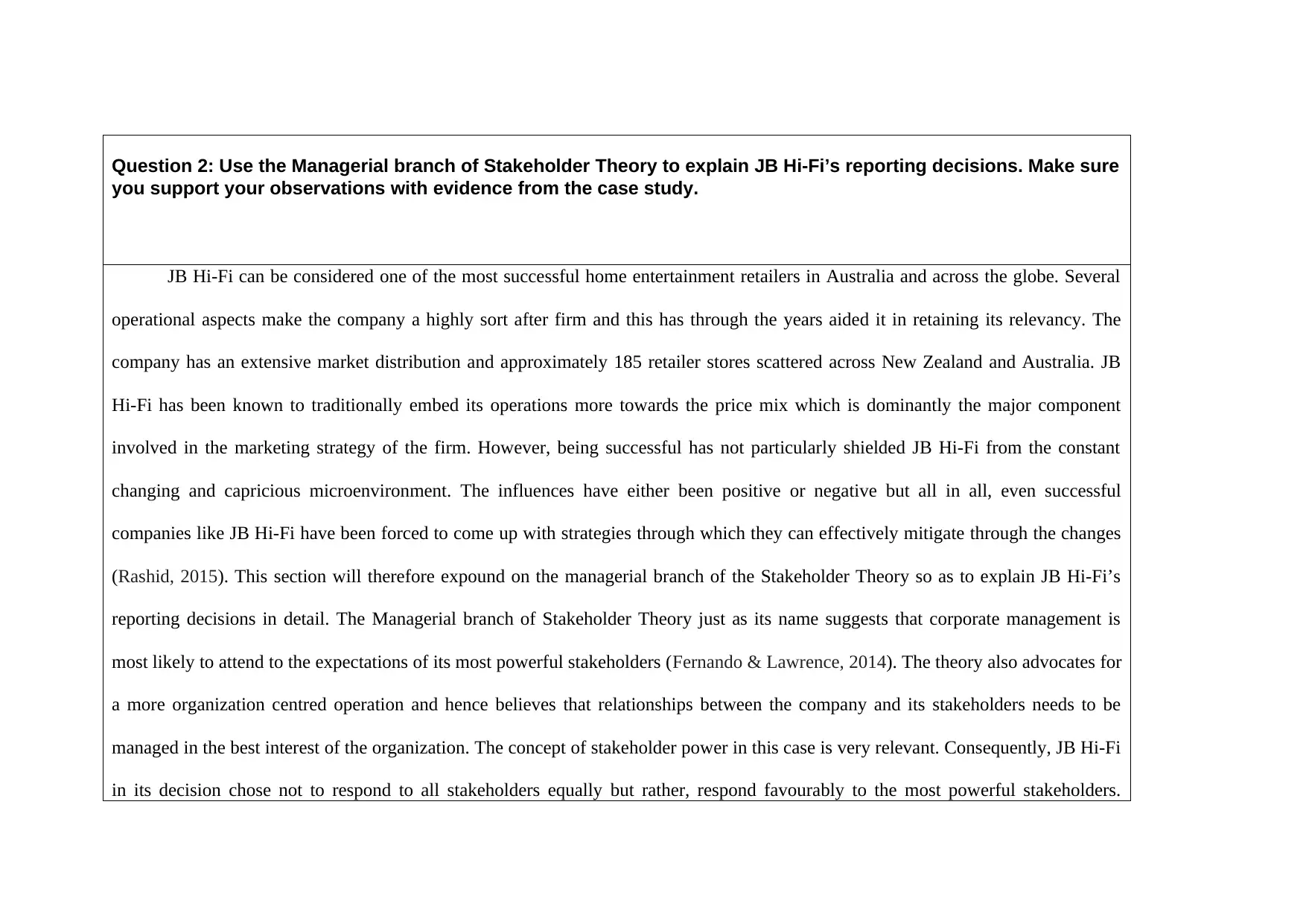
Question 2: Use the Managerial branch of Stakeholder Theory to explain JB Hi-Fi’s reporting decisions. Make sure
you support your observations with evidence from the case study.
JB Hi-Fi can be considered one of the most successful home entertainment retailers in Australia and across the globe. Several
operational aspects make the company a highly sort after firm and this has through the years aided it in retaining its relevancy. The
company has an extensive market distribution and approximately 185 retailer stores scattered across New Zealand and Australia. JB
Hi-Fi has been known to traditionally embed its operations more towards the price mix which is dominantly the major component
involved in the marketing strategy of the firm. However, being successful has not particularly shielded JB Hi-Fi from the constant
changing and capricious microenvironment. The influences have either been positive or negative but all in all, even successful
companies like JB Hi-Fi have been forced to come up with strategies through which they can effectively mitigate through the changes
(Rashid, 2015). This section will therefore expound on the managerial branch of the Stakeholder Theory so as to explain JB Hi-Fi’s
reporting decisions in detail. The Managerial branch of Stakeholder Theory just as its name suggests that corporate management is
most likely to attend to the expectations of its most powerful stakeholders (Fernando & Lawrence, 2014). The theory also advocates for
a more organization centred operation and hence believes that relationships between the company and its stakeholders needs to be
managed in the best interest of the organization. The concept of stakeholder power in this case is very relevant. Consequently, JB Hi-Fi
in its decision chose not to respond to all stakeholders equally but rather, respond favourably to the most powerful stakeholders.
you support your observations with evidence from the case study.
JB Hi-Fi can be considered one of the most successful home entertainment retailers in Australia and across the globe. Several
operational aspects make the company a highly sort after firm and this has through the years aided it in retaining its relevancy. The
company has an extensive market distribution and approximately 185 retailer stores scattered across New Zealand and Australia. JB
Hi-Fi has been known to traditionally embed its operations more towards the price mix which is dominantly the major component
involved in the marketing strategy of the firm. However, being successful has not particularly shielded JB Hi-Fi from the constant
changing and capricious microenvironment. The influences have either been positive or negative but all in all, even successful
companies like JB Hi-Fi have been forced to come up with strategies through which they can effectively mitigate through the changes
(Rashid, 2015). This section will therefore expound on the managerial branch of the Stakeholder Theory so as to explain JB Hi-Fi’s
reporting decisions in detail. The Managerial branch of Stakeholder Theory just as its name suggests that corporate management is
most likely to attend to the expectations of its most powerful stakeholders (Fernando & Lawrence, 2014). The theory also advocates for
a more organization centred operation and hence believes that relationships between the company and its stakeholders needs to be
managed in the best interest of the organization. The concept of stakeholder power in this case is very relevant. Consequently, JB Hi-Fi
in its decision chose not to respond to all stakeholders equally but rather, respond favourably to the most powerful stakeholders.
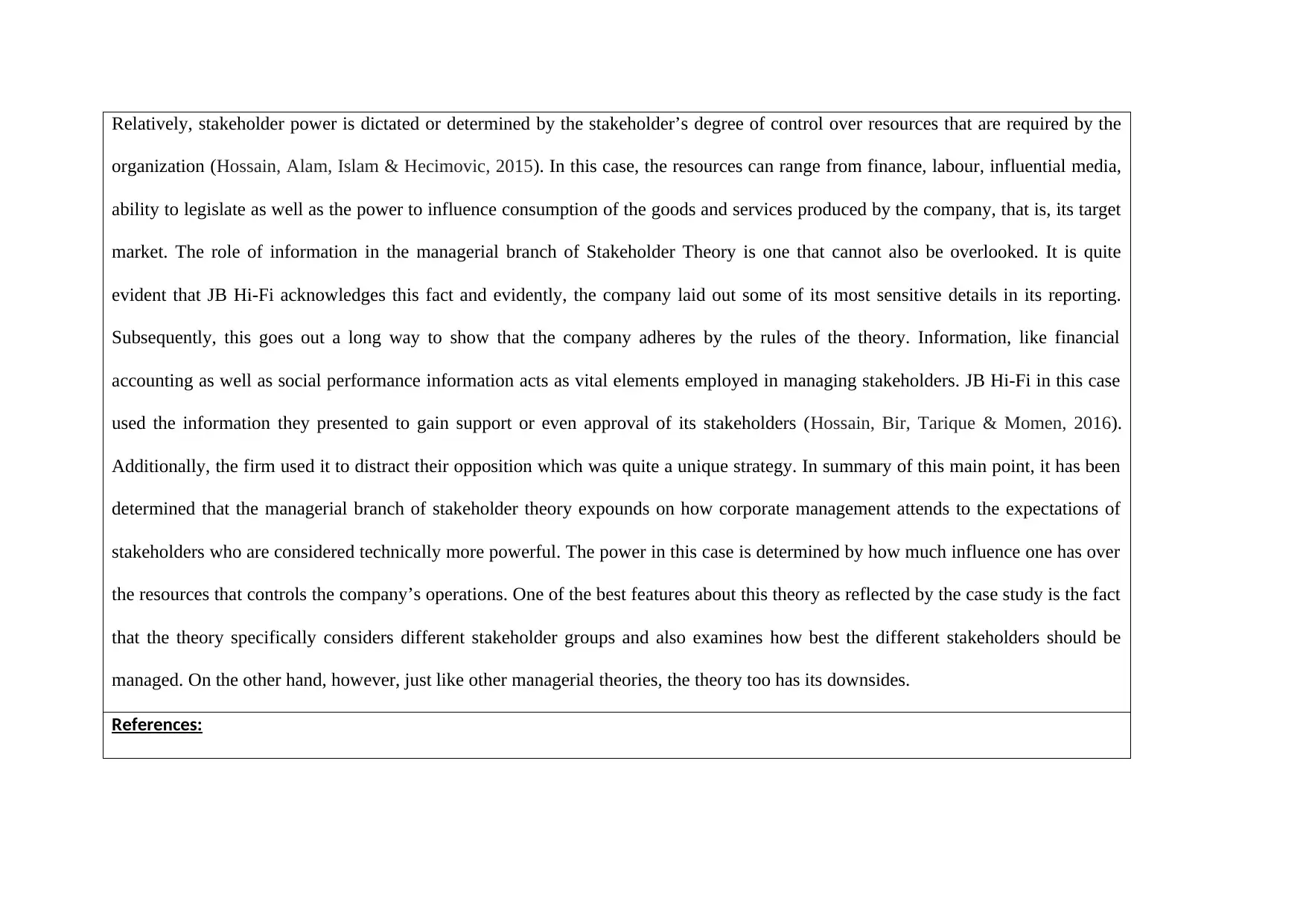
Relatively, stakeholder power is dictated or determined by the stakeholder’s degree of control over resources that are required by the
organization (Hossain, Alam, Islam & Hecimovic, 2015). In this case, the resources can range from finance, labour, influential media,
ability to legislate as well as the power to influence consumption of the goods and services produced by the company, that is, its target
market. The role of information in the managerial branch of Stakeholder Theory is one that cannot also be overlooked. It is quite
evident that JB Hi-Fi acknowledges this fact and evidently, the company laid out some of its most sensitive details in its reporting.
Subsequently, this goes out a long way to show that the company adheres by the rules of the theory. Information, like financial
accounting as well as social performance information acts as vital elements employed in managing stakeholders. JB Hi-Fi in this case
used the information they presented to gain support or even approval of its stakeholders (Hossain, Bir, Tarique & Momen, 2016).
Additionally, the firm used it to distract their opposition which was quite a unique strategy. In summary of this main point, it has been
determined that the managerial branch of stakeholder theory expounds on how corporate management attends to the expectations of
stakeholders who are considered technically more powerful. The power in this case is determined by how much influence one has over
the resources that controls the company’s operations. One of the best features about this theory as reflected by the case study is the fact
that the theory specifically considers different stakeholder groups and also examines how best the different stakeholders should be
managed. On the other hand, however, just like other managerial theories, the theory too has its downsides.
References:
organization (Hossain, Alam, Islam & Hecimovic, 2015). In this case, the resources can range from finance, labour, influential media,
ability to legislate as well as the power to influence consumption of the goods and services produced by the company, that is, its target
market. The role of information in the managerial branch of Stakeholder Theory is one that cannot also be overlooked. It is quite
evident that JB Hi-Fi acknowledges this fact and evidently, the company laid out some of its most sensitive details in its reporting.
Subsequently, this goes out a long way to show that the company adheres by the rules of the theory. Information, like financial
accounting as well as social performance information acts as vital elements employed in managing stakeholders. JB Hi-Fi in this case
used the information they presented to gain support or even approval of its stakeholders (Hossain, Bir, Tarique & Momen, 2016).
Additionally, the firm used it to distract their opposition which was quite a unique strategy. In summary of this main point, it has been
determined that the managerial branch of stakeholder theory expounds on how corporate management attends to the expectations of
stakeholders who are considered technically more powerful. The power in this case is determined by how much influence one has over
the resources that controls the company’s operations. One of the best features about this theory as reflected by the case study is the fact
that the theory specifically considers different stakeholder groups and also examines how best the different stakeholders should be
managed. On the other hand, however, just like other managerial theories, the theory too has its downsides.
References:
⊘ This is a preview!⊘
Do you want full access?
Subscribe today to unlock all pages.

Trusted by 1+ million students worldwide
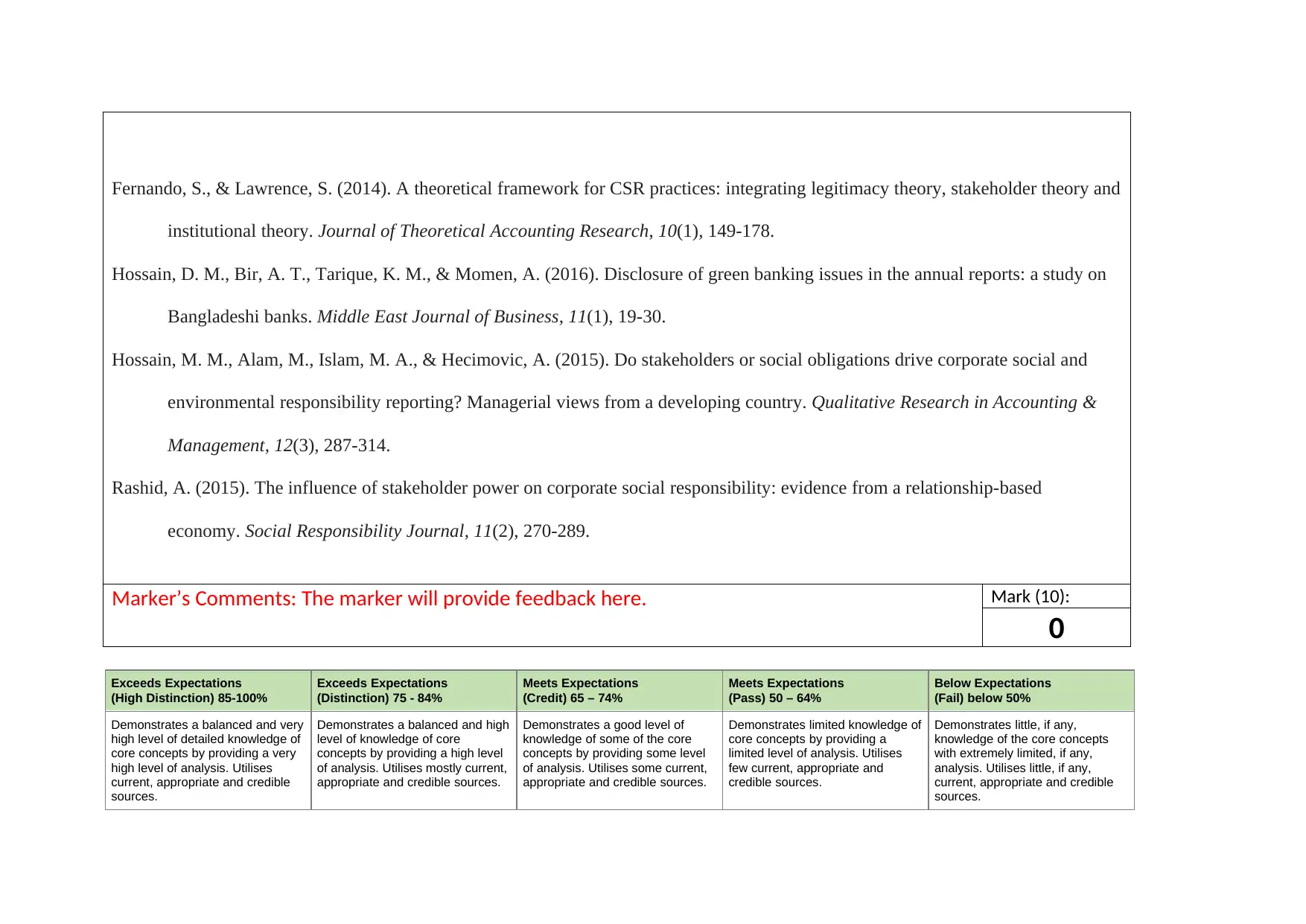
Fernando, S., & Lawrence, S. (2014). A theoretical framework for CSR practices: integrating legitimacy theory, stakeholder theory and
institutional theory. Journal of Theoretical Accounting Research, 10(1), 149-178.
Hossain, D. M., Bir, A. T., Tarique, K. M., & Momen, A. (2016). Disclosure of green banking issues in the annual reports: a study on
Bangladeshi banks. Middle East Journal of Business, 11(1), 19-30.
Hossain, M. M., Alam, M., Islam, M. A., & Hecimovic, A. (2015). Do stakeholders or social obligations drive corporate social and
environmental responsibility reporting? Managerial views from a developing country. Qualitative Research in Accounting &
Management, 12(3), 287-314.
Rashid, A. (2015). The influence of stakeholder power on corporate social responsibility: evidence from a relationship-based
economy. Social Responsibility Journal, 11(2), 270-289.
Marker’s Comments: The marker will provide feedback here. Mark (10):
0
Exceeds Expectations
(High Distinction) 85-100%
Exceeds Expectations
(Distinction) 75 - 84%
Meets Expectations
(Credit) 65 – 74%
Meets Expectations
(Pass) 50 – 64%
Below Expectations
(Fail) below 50%
Demonstrates a balanced and very
high level of detailed knowledge of
core concepts by providing a very
high level of analysis. Utilises
current, appropriate and credible
sources.
Demonstrates a balanced and high
level of knowledge of core
concepts by providing a high level
of analysis. Utilises mostly current,
appropriate and credible sources.
Demonstrates a good level of
knowledge of some of the core
concepts by providing some level
of analysis. Utilises some current,
appropriate and credible sources.
Demonstrates limited knowledge of
core concepts by providing a
limited level of analysis. Utilises
few current, appropriate and
credible sources.
Demonstrates little, if any,
knowledge of the core concepts
with extremely limited, if any,
analysis. Utilises little, if any,
current, appropriate and credible
sources.
institutional theory. Journal of Theoretical Accounting Research, 10(1), 149-178.
Hossain, D. M., Bir, A. T., Tarique, K. M., & Momen, A. (2016). Disclosure of green banking issues in the annual reports: a study on
Bangladeshi banks. Middle East Journal of Business, 11(1), 19-30.
Hossain, M. M., Alam, M., Islam, M. A., & Hecimovic, A. (2015). Do stakeholders or social obligations drive corporate social and
environmental responsibility reporting? Managerial views from a developing country. Qualitative Research in Accounting &
Management, 12(3), 287-314.
Rashid, A. (2015). The influence of stakeholder power on corporate social responsibility: evidence from a relationship-based
economy. Social Responsibility Journal, 11(2), 270-289.
Marker’s Comments: The marker will provide feedback here. Mark (10):
0
Exceeds Expectations
(High Distinction) 85-100%
Exceeds Expectations
(Distinction) 75 - 84%
Meets Expectations
(Credit) 65 – 74%
Meets Expectations
(Pass) 50 – 64%
Below Expectations
(Fail) below 50%
Demonstrates a balanced and very
high level of detailed knowledge of
core concepts by providing a very
high level of analysis. Utilises
current, appropriate and credible
sources.
Demonstrates a balanced and high
level of knowledge of core
concepts by providing a high level
of analysis. Utilises mostly current,
appropriate and credible sources.
Demonstrates a good level of
knowledge of some of the core
concepts by providing some level
of analysis. Utilises some current,
appropriate and credible sources.
Demonstrates limited knowledge of
core concepts by providing a
limited level of analysis. Utilises
few current, appropriate and
credible sources.
Demonstrates little, if any,
knowledge of the core concepts
with extremely limited, if any,
analysis. Utilises little, if any,
current, appropriate and credible
sources.
Paraphrase This Document
Need a fresh take? Get an instant paraphrase of this document with our AI Paraphraser
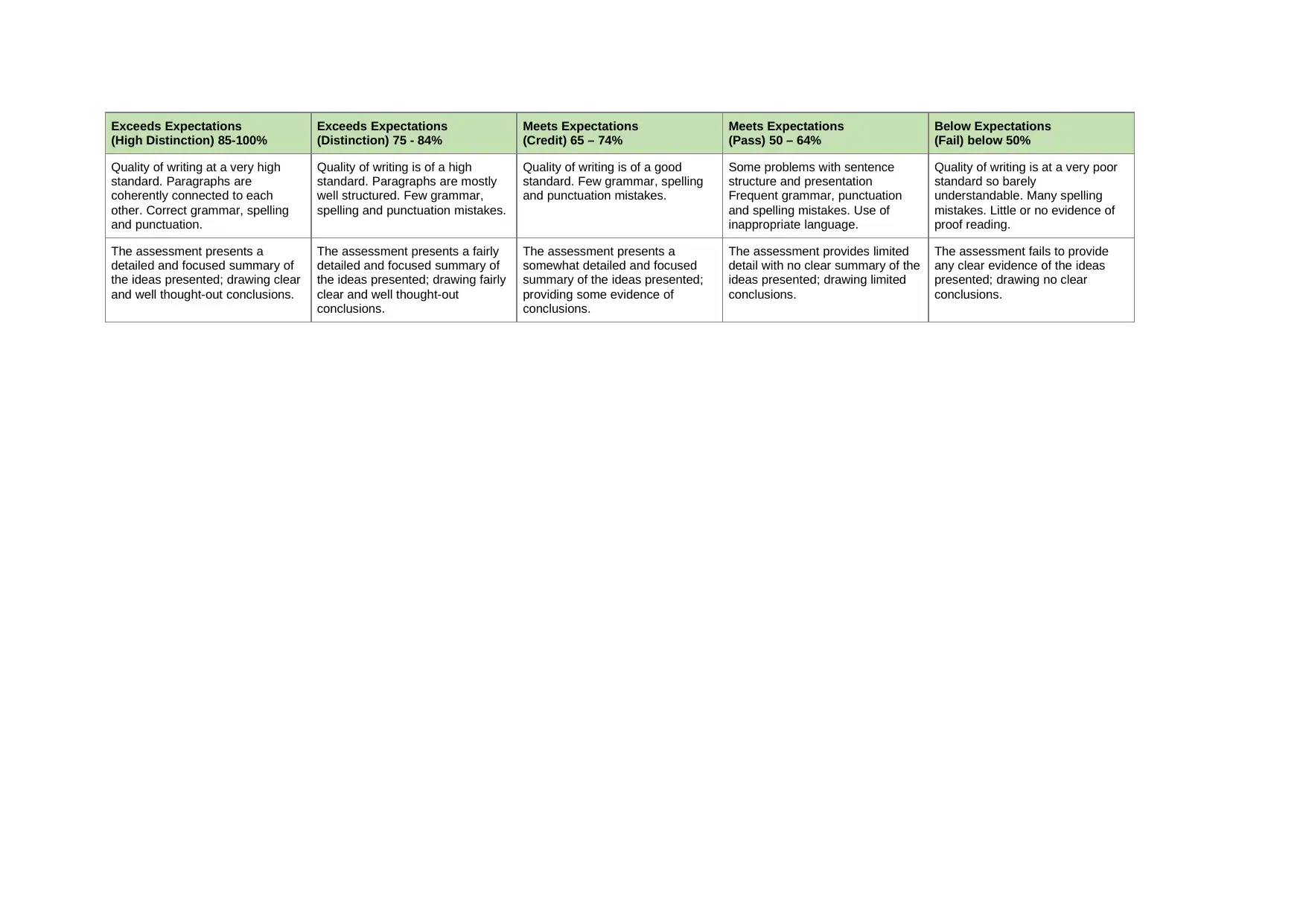
Exceeds Expectations
(High Distinction) 85-100%
Exceeds Expectations
(Distinction) 75 - 84%
Meets Expectations
(Credit) 65 – 74%
Meets Expectations
(Pass) 50 – 64%
Below Expectations
(Fail) below 50%
Quality of writing at a very high
standard. Paragraphs are
coherently connected to each
other. Correct grammar, spelling
and punctuation.
Quality of writing is of a high
standard. Paragraphs are mostly
well structured. Few grammar,
spelling and punctuation mistakes.
Quality of writing is of a good
standard. Few grammar, spelling
and punctuation mistakes.
Some problems with sentence
structure and presentation
Frequent grammar, punctuation
and spelling mistakes. Use of
inappropriate language.
Quality of writing is at a very poor
standard so barely
understandable. Many spelling
mistakes. Little or no evidence of
proof reading.
The assessment presents a
detailed and focused summary of
the ideas presented; drawing clear
and well thought-out conclusions.
The assessment presents a fairly
detailed and focused summary of
the ideas presented; drawing fairly
clear and well thought-out
conclusions.
The assessment presents a
somewhat detailed and focused
summary of the ideas presented;
providing some evidence of
conclusions.
The assessment provides limited
detail with no clear summary of the
ideas presented; drawing limited
conclusions.
The assessment fails to provide
any clear evidence of the ideas
presented; drawing no clear
conclusions.
(High Distinction) 85-100%
Exceeds Expectations
(Distinction) 75 - 84%
Meets Expectations
(Credit) 65 – 74%
Meets Expectations
(Pass) 50 – 64%
Below Expectations
(Fail) below 50%
Quality of writing at a very high
standard. Paragraphs are
coherently connected to each
other. Correct grammar, spelling
and punctuation.
Quality of writing is of a high
standard. Paragraphs are mostly
well structured. Few grammar,
spelling and punctuation mistakes.
Quality of writing is of a good
standard. Few grammar, spelling
and punctuation mistakes.
Some problems with sentence
structure and presentation
Frequent grammar, punctuation
and spelling mistakes. Use of
inappropriate language.
Quality of writing is at a very poor
standard so barely
understandable. Many spelling
mistakes. Little or no evidence of
proof reading.
The assessment presents a
detailed and focused summary of
the ideas presented; drawing clear
and well thought-out conclusions.
The assessment presents a fairly
detailed and focused summary of
the ideas presented; drawing fairly
clear and well thought-out
conclusions.
The assessment presents a
somewhat detailed and focused
summary of the ideas presented;
providing some evidence of
conclusions.
The assessment provides limited
detail with no clear summary of the
ideas presented; drawing limited
conclusions.
The assessment fails to provide
any clear evidence of the ideas
presented; drawing no clear
conclusions.
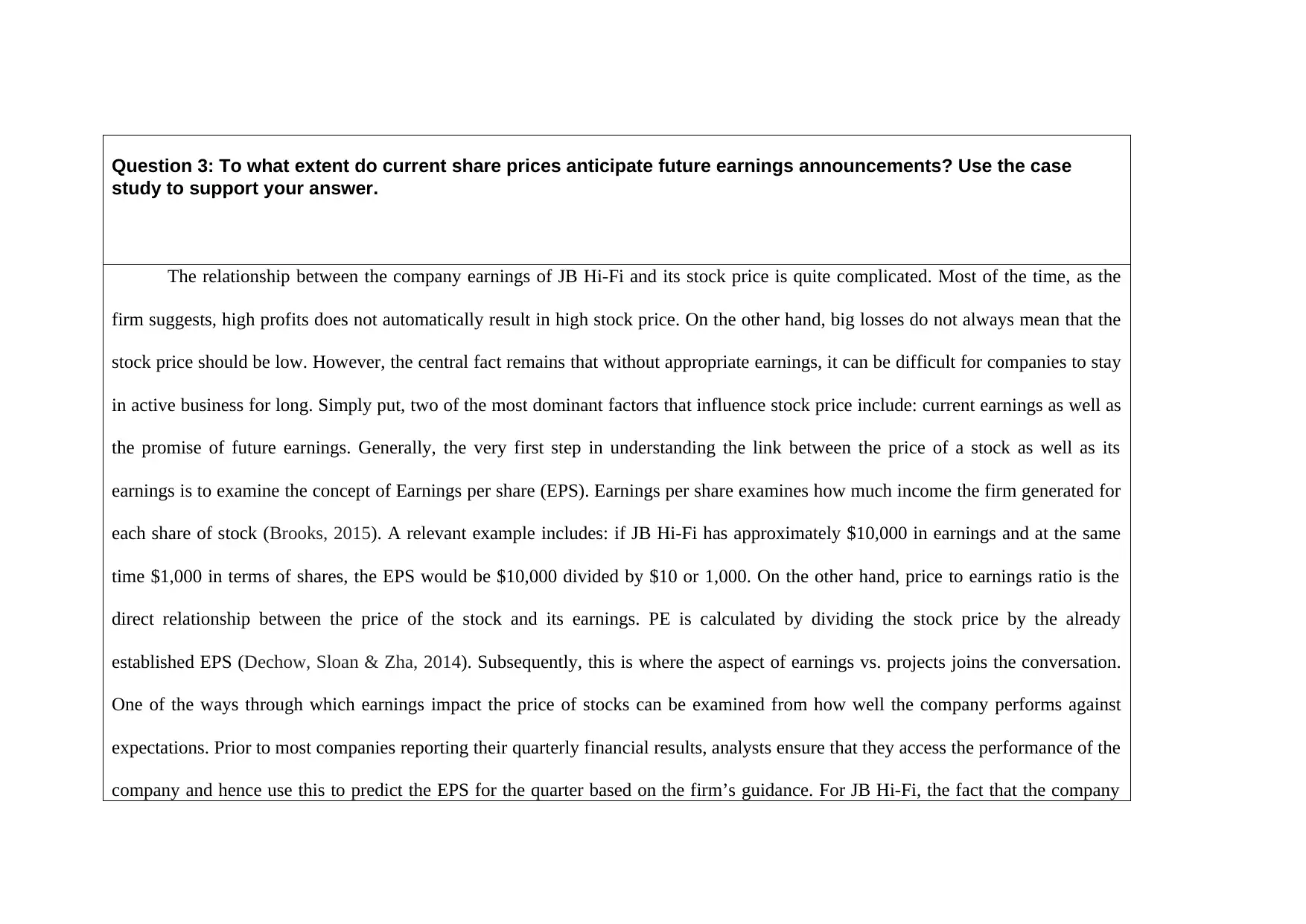
Question 3: To what extent do current share prices anticipate future earnings announcements? Use the case
study to support your answer.
The relationship between the company earnings of JB Hi-Fi and its stock price is quite complicated. Most of the time, as the
firm suggests, high profits does not automatically result in high stock price. On the other hand, big losses do not always mean that the
stock price should be low. However, the central fact remains that without appropriate earnings, it can be difficult for companies to stay
in active business for long. Simply put, two of the most dominant factors that influence stock price include: current earnings as well as
the promise of future earnings. Generally, the very first step in understanding the link between the price of a stock as well as its
earnings is to examine the concept of Earnings per share (EPS). Earnings per share examines how much income the firm generated for
each share of stock (Brooks, 2015). A relevant example includes: if JB Hi-Fi has approximately $10,000 in earnings and at the same
time $1,000 in terms of shares, the EPS would be $10,000 divided by $10 or 1,000. On the other hand, price to earnings ratio is the
direct relationship between the price of the stock and its earnings. PE is calculated by dividing the stock price by the already
established EPS (Dechow, Sloan & Zha, 2014). Subsequently, this is where the aspect of earnings vs. projects joins the conversation.
One of the ways through which earnings impact the price of stocks can be examined from how well the company performs against
expectations. Prior to most companies reporting their quarterly financial results, analysts ensure that they access the performance of the
company and hence use this to predict the EPS for the quarter based on the firm’s guidance. For JB Hi-Fi, the fact that the company
study to support your answer.
The relationship between the company earnings of JB Hi-Fi and its stock price is quite complicated. Most of the time, as the
firm suggests, high profits does not automatically result in high stock price. On the other hand, big losses do not always mean that the
stock price should be low. However, the central fact remains that without appropriate earnings, it can be difficult for companies to stay
in active business for long. Simply put, two of the most dominant factors that influence stock price include: current earnings as well as
the promise of future earnings. Generally, the very first step in understanding the link between the price of a stock as well as its
earnings is to examine the concept of Earnings per share (EPS). Earnings per share examines how much income the firm generated for
each share of stock (Brooks, 2015). A relevant example includes: if JB Hi-Fi has approximately $10,000 in earnings and at the same
time $1,000 in terms of shares, the EPS would be $10,000 divided by $10 or 1,000. On the other hand, price to earnings ratio is the
direct relationship between the price of the stock and its earnings. PE is calculated by dividing the stock price by the already
established EPS (Dechow, Sloan & Zha, 2014). Subsequently, this is where the aspect of earnings vs. projects joins the conversation.
One of the ways through which earnings impact the price of stocks can be examined from how well the company performs against
expectations. Prior to most companies reporting their quarterly financial results, analysts ensure that they access the performance of the
company and hence use this to predict the EPS for the quarter based on the firm’s guidance. For JB Hi-Fi, the fact that the company
⊘ This is a preview!⊘
Do you want full access?
Subscribe today to unlock all pages.

Trusted by 1+ million students worldwide
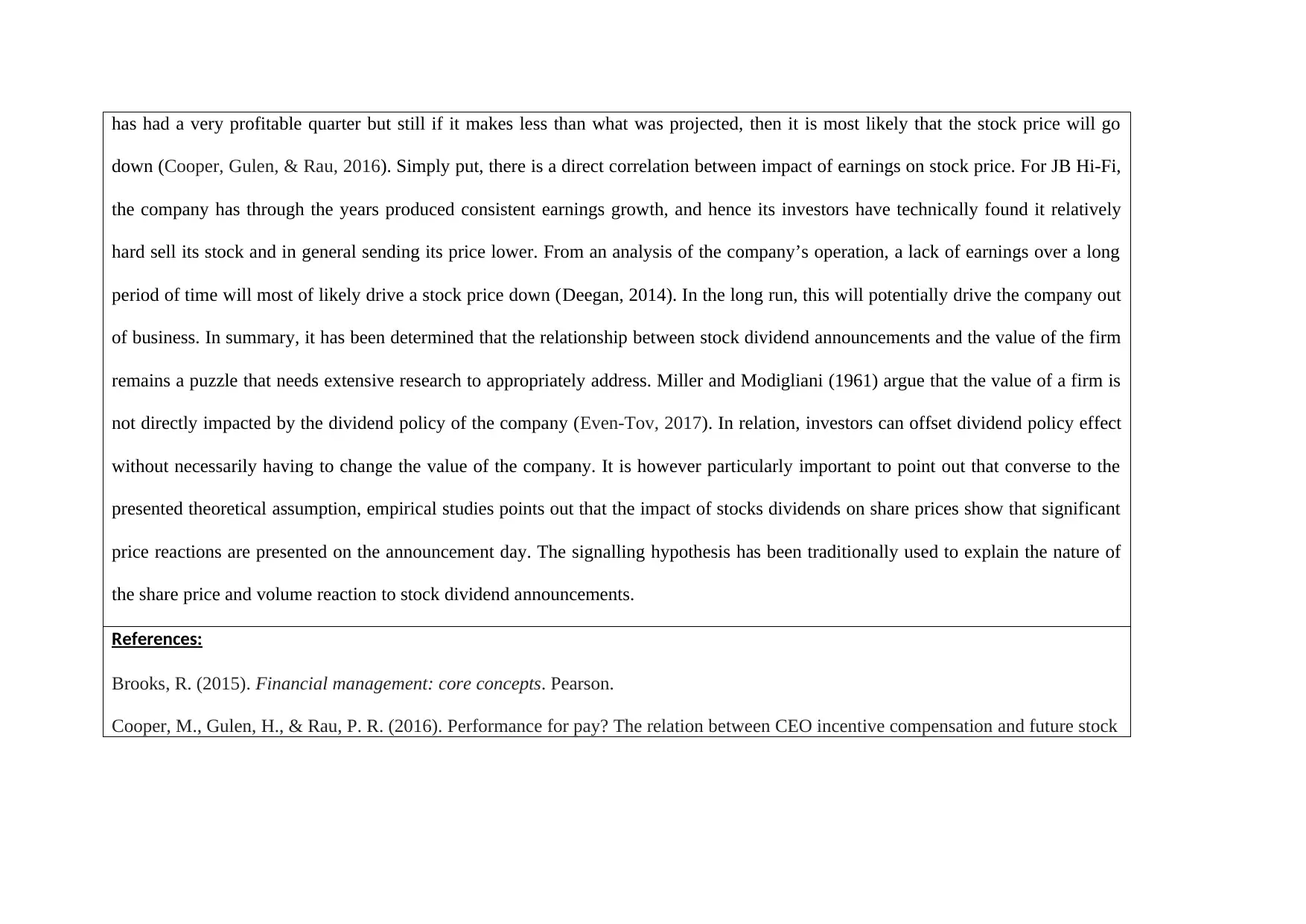
has had a very profitable quarter but still if it makes less than what was projected, then it is most likely that the stock price will go
down (Cooper, Gulen, & Rau, 2016). Simply put, there is a direct correlation between impact of earnings on stock price. For JB Hi-Fi,
the company has through the years produced consistent earnings growth, and hence its investors have technically found it relatively
hard sell its stock and in general sending its price lower. From an analysis of the company’s operation, a lack of earnings over a long
period of time will most of likely drive a stock price down (Deegan, 2014). In the long run, this will potentially drive the company out
of business. In summary, it has been determined that the relationship between stock dividend announcements and the value of the firm
remains a puzzle that needs extensive research to appropriately address. Miller and Modigliani (1961) argue that the value of a firm is
not directly impacted by the dividend policy of the company (Even-Tov, 2017). In relation, investors can offset dividend policy effect
without necessarily having to change the value of the company. It is however particularly important to point out that converse to the
presented theoretical assumption, empirical studies points out that the impact of stocks dividends on share prices show that significant
price reactions are presented on the announcement day. The signalling hypothesis has been traditionally used to explain the nature of
the share price and volume reaction to stock dividend announcements.
References:
Brooks, R. (2015). Financial management: core concepts. Pearson.
Cooper, M., Gulen, H., & Rau, P. R. (2016). Performance for pay? The relation between CEO incentive compensation and future stock
down (Cooper, Gulen, & Rau, 2016). Simply put, there is a direct correlation between impact of earnings on stock price. For JB Hi-Fi,
the company has through the years produced consistent earnings growth, and hence its investors have technically found it relatively
hard sell its stock and in general sending its price lower. From an analysis of the company’s operation, a lack of earnings over a long
period of time will most of likely drive a stock price down (Deegan, 2014). In the long run, this will potentially drive the company out
of business. In summary, it has been determined that the relationship between stock dividend announcements and the value of the firm
remains a puzzle that needs extensive research to appropriately address. Miller and Modigliani (1961) argue that the value of a firm is
not directly impacted by the dividend policy of the company (Even-Tov, 2017). In relation, investors can offset dividend policy effect
without necessarily having to change the value of the company. It is however particularly important to point out that converse to the
presented theoretical assumption, empirical studies points out that the impact of stocks dividends on share prices show that significant
price reactions are presented on the announcement day. The signalling hypothesis has been traditionally used to explain the nature of
the share price and volume reaction to stock dividend announcements.
References:
Brooks, R. (2015). Financial management: core concepts. Pearson.
Cooper, M., Gulen, H., & Rau, P. R. (2016). Performance for pay? The relation between CEO incentive compensation and future stock
Paraphrase This Document
Need a fresh take? Get an instant paraphrase of this document with our AI Paraphraser
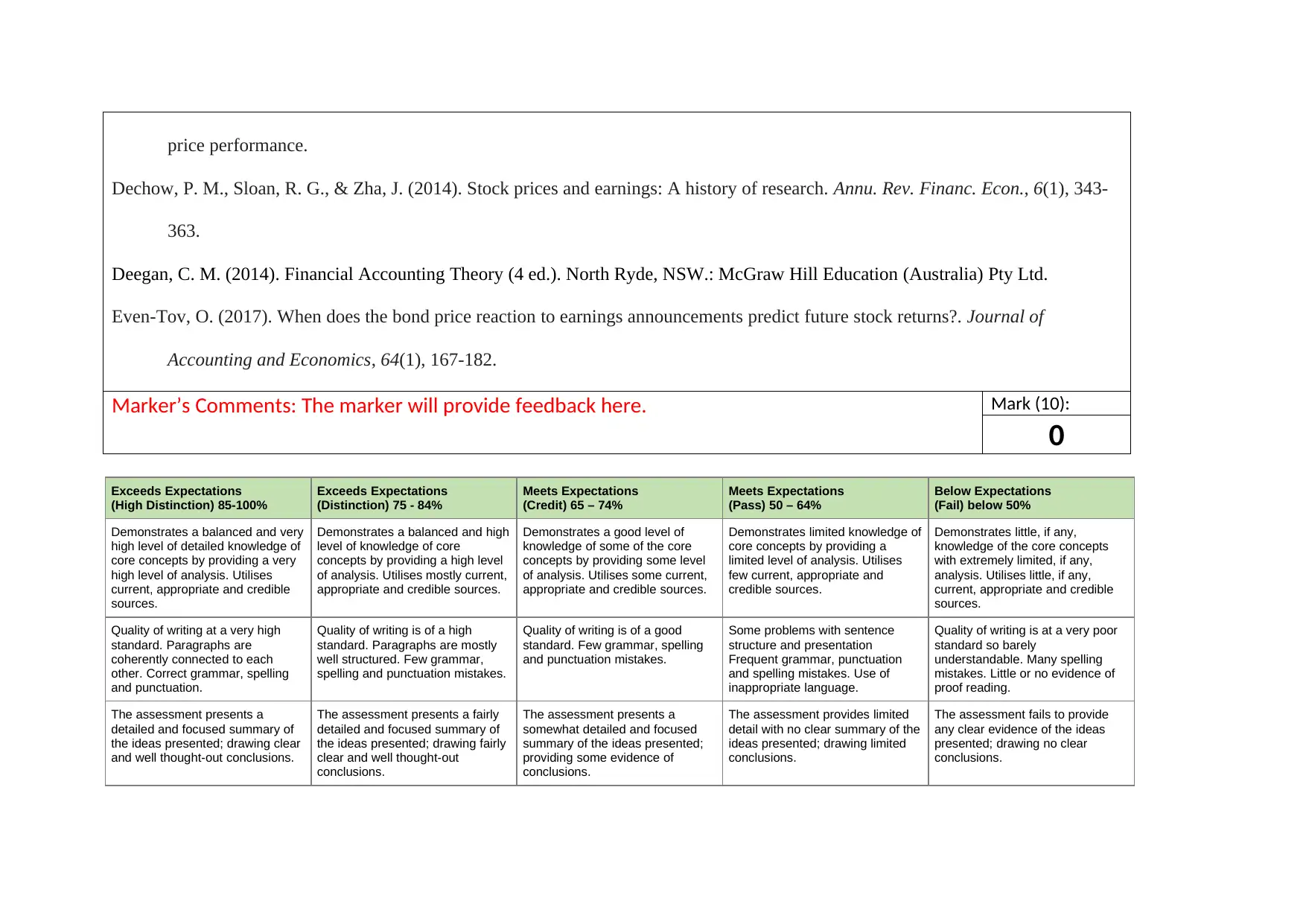
price performance.
Dechow, P. M., Sloan, R. G., & Zha, J. (2014). Stock prices and earnings: A history of research. Annu. Rev. Financ. Econ., 6(1), 343-
363.
Deegan, C. M. (2014). Financial Accounting Theory (4 ed.). North Ryde, NSW.: McGraw Hill Education (Australia) Pty Ltd.
Even-Tov, O. (2017). When does the bond price reaction to earnings announcements predict future stock returns?. Journal of
Accounting and Economics, 64(1), 167-182.
Marker’s Comments: The marker will provide feedback here. Mark (10):
0
Exceeds Expectations
(High Distinction) 85-100%
Exceeds Expectations
(Distinction) 75 - 84%
Meets Expectations
(Credit) 65 – 74%
Meets Expectations
(Pass) 50 – 64%
Below Expectations
(Fail) below 50%
Demonstrates a balanced and very
high level of detailed knowledge of
core concepts by providing a very
high level of analysis. Utilises
current, appropriate and credible
sources.
Demonstrates a balanced and high
level of knowledge of core
concepts by providing a high level
of analysis. Utilises mostly current,
appropriate and credible sources.
Demonstrates a good level of
knowledge of some of the core
concepts by providing some level
of analysis. Utilises some current,
appropriate and credible sources.
Demonstrates limited knowledge of
core concepts by providing a
limited level of analysis. Utilises
few current, appropriate and
credible sources.
Demonstrates little, if any,
knowledge of the core concepts
with extremely limited, if any,
analysis. Utilises little, if any,
current, appropriate and credible
sources.
Quality of writing at a very high
standard. Paragraphs are
coherently connected to each
other. Correct grammar, spelling
and punctuation.
Quality of writing is of a high
standard. Paragraphs are mostly
well structured. Few grammar,
spelling and punctuation mistakes.
Quality of writing is of a good
standard. Few grammar, spelling
and punctuation mistakes.
Some problems with sentence
structure and presentation
Frequent grammar, punctuation
and spelling mistakes. Use of
inappropriate language.
Quality of writing is at a very poor
standard so barely
understandable. Many spelling
mistakes. Little or no evidence of
proof reading.
The assessment presents a
detailed and focused summary of
the ideas presented; drawing clear
and well thought-out conclusions.
The assessment presents a fairly
detailed and focused summary of
the ideas presented; drawing fairly
clear and well thought-out
conclusions.
The assessment presents a
somewhat detailed and focused
summary of the ideas presented;
providing some evidence of
conclusions.
The assessment provides limited
detail with no clear summary of the
ideas presented; drawing limited
conclusions.
The assessment fails to provide
any clear evidence of the ideas
presented; drawing no clear
conclusions.
Dechow, P. M., Sloan, R. G., & Zha, J. (2014). Stock prices and earnings: A history of research. Annu. Rev. Financ. Econ., 6(1), 343-
363.
Deegan, C. M. (2014). Financial Accounting Theory (4 ed.). North Ryde, NSW.: McGraw Hill Education (Australia) Pty Ltd.
Even-Tov, O. (2017). When does the bond price reaction to earnings announcements predict future stock returns?. Journal of
Accounting and Economics, 64(1), 167-182.
Marker’s Comments: The marker will provide feedback here. Mark (10):
0
Exceeds Expectations
(High Distinction) 85-100%
Exceeds Expectations
(Distinction) 75 - 84%
Meets Expectations
(Credit) 65 – 74%
Meets Expectations
(Pass) 50 – 64%
Below Expectations
(Fail) below 50%
Demonstrates a balanced and very
high level of detailed knowledge of
core concepts by providing a very
high level of analysis. Utilises
current, appropriate and credible
sources.
Demonstrates a balanced and high
level of knowledge of core
concepts by providing a high level
of analysis. Utilises mostly current,
appropriate and credible sources.
Demonstrates a good level of
knowledge of some of the core
concepts by providing some level
of analysis. Utilises some current,
appropriate and credible sources.
Demonstrates limited knowledge of
core concepts by providing a
limited level of analysis. Utilises
few current, appropriate and
credible sources.
Demonstrates little, if any,
knowledge of the core concepts
with extremely limited, if any,
analysis. Utilises little, if any,
current, appropriate and credible
sources.
Quality of writing at a very high
standard. Paragraphs are
coherently connected to each
other. Correct grammar, spelling
and punctuation.
Quality of writing is of a high
standard. Paragraphs are mostly
well structured. Few grammar,
spelling and punctuation mistakes.
Quality of writing is of a good
standard. Few grammar, spelling
and punctuation mistakes.
Some problems with sentence
structure and presentation
Frequent grammar, punctuation
and spelling mistakes. Use of
inappropriate language.
Quality of writing is at a very poor
standard so barely
understandable. Many spelling
mistakes. Little or no evidence of
proof reading.
The assessment presents a
detailed and focused summary of
the ideas presented; drawing clear
and well thought-out conclusions.
The assessment presents a fairly
detailed and focused summary of
the ideas presented; drawing fairly
clear and well thought-out
conclusions.
The assessment presents a
somewhat detailed and focused
summary of the ideas presented;
providing some evidence of
conclusions.
The assessment provides limited
detail with no clear summary of the
ideas presented; drawing limited
conclusions.
The assessment fails to provide
any clear evidence of the ideas
presented; drawing no clear
conclusions.
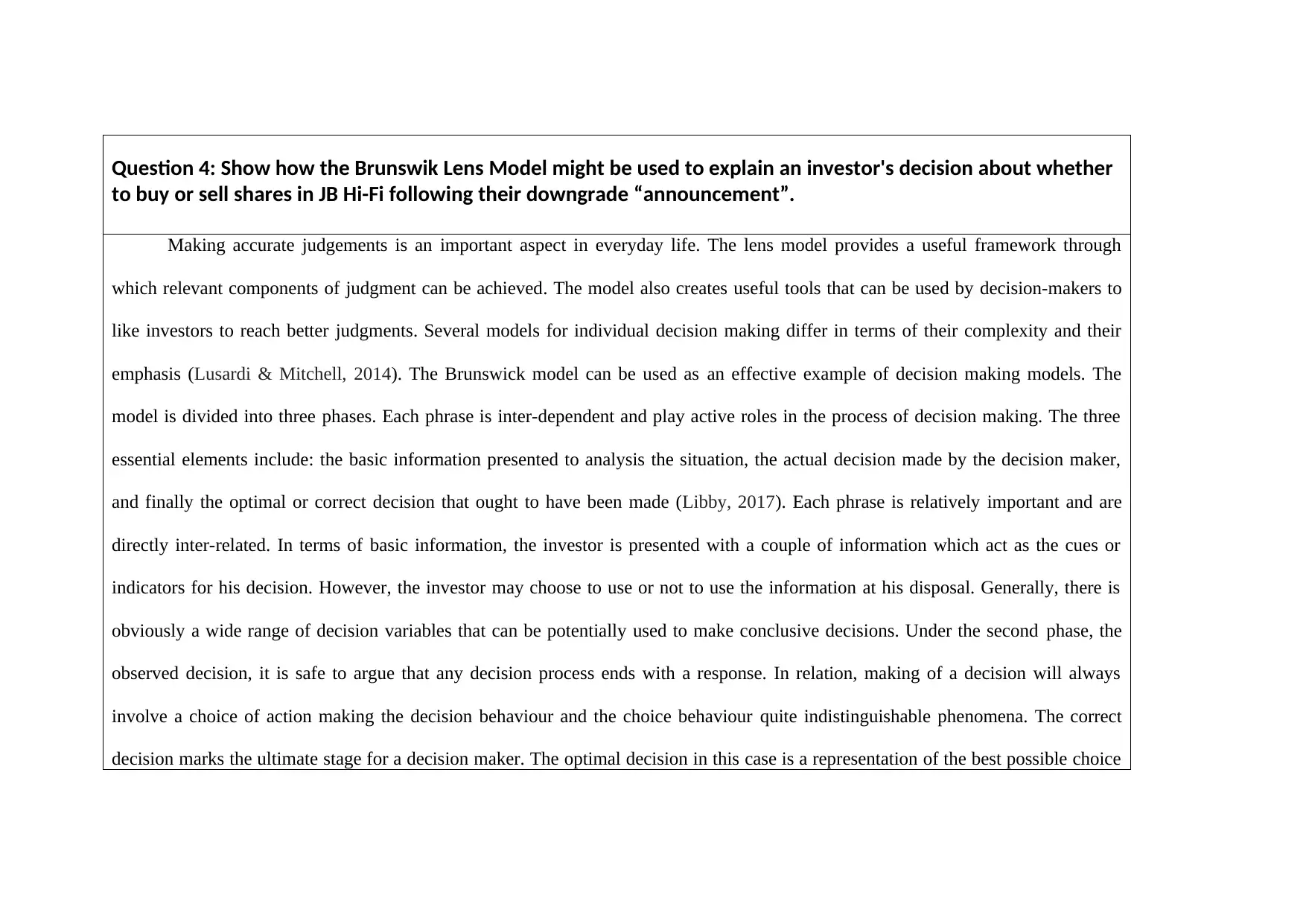
Question 4: Show how the Brunswik Lens Model might be used to explain an investor's decision about whether
to buy or sell shares in JB Hi-Fi following their downgrade “announcement”.
Making accurate judgements is an important aspect in everyday life. The lens model provides a useful framework through
which relevant components of judgment can be achieved. The model also creates useful tools that can be used by decision-makers to
like investors to reach better judgments. Several models for individual decision making differ in terms of their complexity and their
emphasis (Lusardi & Mitchell, 2014). The Brunswick model can be used as an effective example of decision making models. The
model is divided into three phases. Each phrase is inter-dependent and play active roles in the process of decision making. The three
essential elements include: the basic information presented to analysis the situation, the actual decision made by the decision maker,
and finally the optimal or correct decision that ought to have been made (Libby, 2017). Each phrase is relatively important and are
directly inter-related. In terms of basic information, the investor is presented with a couple of information which act as the cues or
indicators for his decision. However, the investor may choose to use or not to use the information at his disposal. Generally, there is
obviously a wide range of decision variables that can be potentially used to make conclusive decisions. Under the second phase, the
observed decision, it is safe to argue that any decision process ends with a response. In relation, making of a decision will always
involve a choice of action making the decision behaviour and the choice behaviour quite indistinguishable phenomena. The correct
decision marks the ultimate stage for a decision maker. The optimal decision in this case is a representation of the best possible choice
to buy or sell shares in JB Hi-Fi following their downgrade “announcement”.
Making accurate judgements is an important aspect in everyday life. The lens model provides a useful framework through
which relevant components of judgment can be achieved. The model also creates useful tools that can be used by decision-makers to
like investors to reach better judgments. Several models for individual decision making differ in terms of their complexity and their
emphasis (Lusardi & Mitchell, 2014). The Brunswick model can be used as an effective example of decision making models. The
model is divided into three phases. Each phrase is inter-dependent and play active roles in the process of decision making. The three
essential elements include: the basic information presented to analysis the situation, the actual decision made by the decision maker,
and finally the optimal or correct decision that ought to have been made (Libby, 2017). Each phrase is relatively important and are
directly inter-related. In terms of basic information, the investor is presented with a couple of information which act as the cues or
indicators for his decision. However, the investor may choose to use or not to use the information at his disposal. Generally, there is
obviously a wide range of decision variables that can be potentially used to make conclusive decisions. Under the second phase, the
observed decision, it is safe to argue that any decision process ends with a response. In relation, making of a decision will always
involve a choice of action making the decision behaviour and the choice behaviour quite indistinguishable phenomena. The correct
decision marks the ultimate stage for a decision maker. The optimal decision in this case is a representation of the best possible choice
⊘ This is a preview!⊘
Do you want full access?
Subscribe today to unlock all pages.

Trusted by 1+ million students worldwide
1 out of 17
Related Documents
Your All-in-One AI-Powered Toolkit for Academic Success.
+13062052269
info@desklib.com
Available 24*7 on WhatsApp / Email
![[object Object]](/_next/static/media/star-bottom.7253800d.svg)
Unlock your academic potential
Copyright © 2020–2026 A2Z Services. All Rights Reserved. Developed and managed by ZUCOL.



